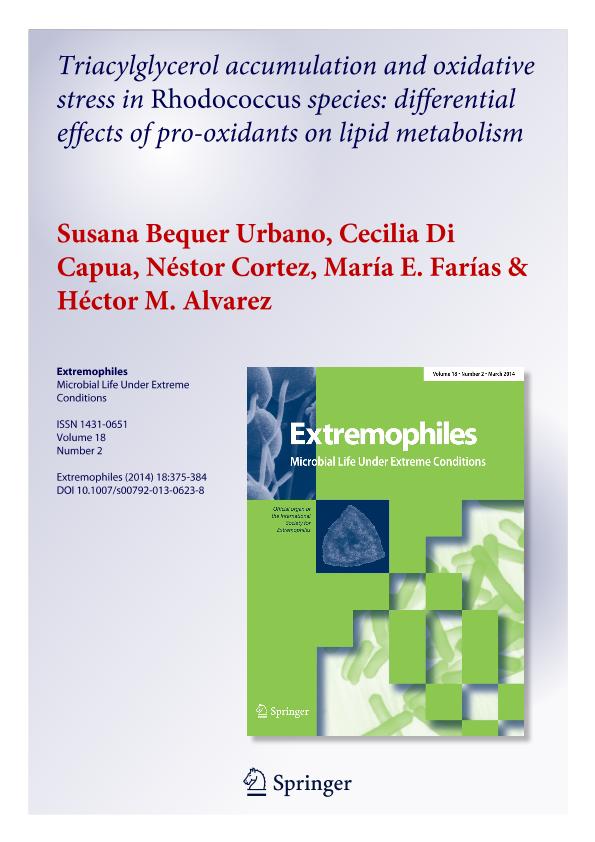Artículo
Triacylglycerol accumulation and oxidative stress in Rhodococcus species: differential effects of pro-oxidants on lipid metabolism
Bequer Urbano, Susana de los Ángeles ; Di Capua, Cecilia Beatriz
; Di Capua, Cecilia Beatriz ; Cortez, Nestor Ricardo
; Cortez, Nestor Ricardo ; Farias, Maria Eugenia
; Farias, Maria Eugenia ; Alvarez, Hector Manuel
; Alvarez, Hector Manuel
 ; Di Capua, Cecilia Beatriz
; Di Capua, Cecilia Beatriz ; Cortez, Nestor Ricardo
; Cortez, Nestor Ricardo ; Farias, Maria Eugenia
; Farias, Maria Eugenia ; Alvarez, Hector Manuel
; Alvarez, Hector Manuel
Fecha de publicación:
04/2014
Editorial:
Springer Tokyo
Revista:
Extremophiles
ISSN:
1431-0651
Idioma:
Inglés
Tipo de recurso:
Artículo publicado
Clasificación temática:
Resumen
In general, members of Rhodococcus genus are highly resistant to desiccation. Desiccation is a complex process which includes the formation of reactive oxygen species that results in significant damage to cells. In this study, we demonstrate that extremophile actinobacterial strains isolated from diverse environments, mainly belonging to Rhodococcus genus, exhibited high tolerance to the pro-oxidants hydrogen peroxide (H2O2) and methyl viologen (MV). In addition, we investigated the possible interconnections between the responses of the oleaginous Rhodococcus opacus PD630 to oxidative stress and lipid metabolism, since both processes demand a metabolic reorganization of cells. Experiments with metabolic inhibitors showed differential effects of both pro-oxidants on lipid metabolism in PD630 cells. The inhibition of carotenoid biosynthesis by the addition of diphenylamine to the media negatively affected the tolerance of cells to H2O2, but not to MV. The inhibition of triacylglycerol (TAG) biosynthesis and accumulation in PD630 did not affect the tolerance of cells to H2O2 and MV; whereas, the blockage of lipolysis decreased the tolerance of cells to H2O2 (but not MV) under carbon-starvation conditions. Interestingly, the addition of MV to the media (but not H2O2) induced a reduction of TAG accumulation by cells. Resuming, results of this study revealed metabolic connections between lipid metabolism and oxidative stress responses in R. opacus PD630, and probably in other extremophile TAG-accumulating rhodococci
Palabras clave:
Physiology
,
Metabolism
,
Rhodococcus
Archivos asociados
Licencia
Identificadores
Colecciones
Articulos(IBR)
Articulos de INST.DE BIOLOGIA MOLECULAR Y CELULAR DE ROSARIO
Articulos de INST.DE BIOLOGIA MOLECULAR Y CELULAR DE ROSARIO
Citación
Bequer Urbano, Susana de los Ángeles; Di Capua, Cecilia Beatriz; Cortez, Nestor Ricardo; Farias, Maria Eugenia; Alvarez, Hector Manuel; Triacylglycerol accumulation and oxidative stress in Rhodococcus species: differential effects of pro-oxidants on lipid metabolism; Springer Tokyo; Extremophiles; 18; 2; 4-2014; 375-384
Compartir
Altmétricas



